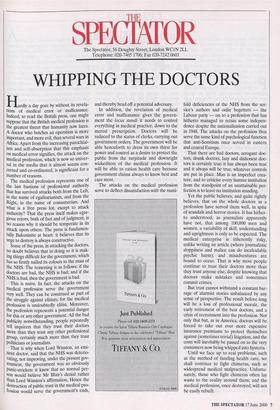SPECI E ATOR The Spectator, 56 Doughty Street, London WC1N 2LL Telephone:
020-7405 1706; Fax 020-7242 0603
WHIPPING THE DOCTORS
Hardly a day goes by without its revela- tions of medical error or malfeasance. Indeed, to read the British press, one might suppose that the British medical profession is the greatest threat that humanity now faces. A doctor who botches an operation is more important, and more evil, than several wars in Africa. Apart from the increasing parochial- ism and self-absorption that this emphasis cm medical error signifies, the attack on the medical profession, which is now so univer- sal in the media that it almost seems con- certed and co-ordinated, is significant for a number of reasons.
The medical profession represents one of the last bastions of professional authority that has survived attacks both from the Left, in the name of egalitarianism, and from the Right, in the name of consumerism. And What is a free press for, except to attack authority? That the press itself makes egre- gious errors, both of fact and of judgment, is no reason why it should be temperate in its attack upon others. The press is fundamen- tally Bakuninite at heart: it believes that its urge to destroy is always constructive. Some of the press, in attacking the doctors, no doubt believes that in doing so it is mak- ing things difficult for the government, which has so firmly nailed its colours to the mast of the NHS. The reasoning is as follows: if the doctors are bad, the NHS is bad; and if the NHS is bad, then the government is bad. This is naive. In fact, the attacks on the medical profession serve the government very well. They can be construed as part of the struggle against elitism, for the medical profession is undoubtedly elitist. Moreover, the profession represents a potential danger for this or any other government. All the bad Publicity notwithstanding, people repeatedly tell inquirers that they trust their doctors more than they trust any other professional group, certainly much more than they trust Politicians or journalists. That is why when Lord Winston, an emi- nent doctor, said that the NHS was deterio- rating, not improving, under the present gov- ernment, the government was so obviously Panic-stricken: it knew that no normal per- son would believe Mr Blair's denial rather than Lord Winston's affirmation. Hence the destruction of public trust in the medical pro- fession would serve the government's ends, and thereby head off a potential adversary.
In addition, the revelation of medical error and malfeasance gives the govern- ment the locus standi it needs to control everything in medical practice, down to the merest prescription. Doctors will be reduced to the status of clerks, carrying out government orders. The government will be able henceforth to dress its own thirst for power and control as a desire to protect the public from the turpitude and downright wickedness of the medical profession. It will be able to ration health care because government claims always to know best and care most.
The attacks on the medical profession serve to deflect dissatisfaction with the mani- fold deficiencies of the NHS from the ser- vice's authors and onlie begetters — the Labour party — on to a profession that has hitherto managed to retain some indepen- dence despite the nationalisation carried out in 1948. The attacks on the profession thus serve the same kind of psychological function that anti-Semitism once served in eastern and central Europe.
That there are bad doctors, arrogant doc- tors, drunk doctors, lazy and dishonest doc- tors is certainly true: it has always been true and it always will be true, whatever controls are put in place. Man is an imperfect crea- ture, and to criticise every human institution from the standpoint of an unattainable per- fection is to leave no institution standing.
Yet the public believes, and quite rightly believes, that on the whole doctors as a profession have served them well, in spite of scandals and horror stories. It has hither- to understood, as journalists apparently have not, that among 100,000 men and women, a variability of skill, understanding and uprightness is only to be expected. The medical enterprise is inherently risky, unlike writing an article (where journalistic sloppiness and malice can do incalculable psychic harm); and misadventures are bound to occur. That is why most people continue to trust their doctors more than they trust anyone else, despite knowing that doctors make mistakes and sometimes commit crimes.
But trust cannot withstand a constant bar- rage of alarmist stories unbalanced by any sense of perspective. The result before long will be a loss of professional morale, the early retirement of the best doctors, and a crisis of recruitment into the profession. Not only that but, as in America, doctors will be forced to take out ever more expensive insurance premiums to protect themselves against (sometimes trivial) litigation, and the costs will inevitably be passed on to the very consumers now being whipped into hysteria.
Until we face up to real problems, such as the method of funding health care, we shall continue to fight chimeras, such as widespread medical malpractice. Unfortu- nately, those who fight chimeras often lay waste to the reality around them; and the medical profession, once destroyed, will not be easily rebuilt.










































































 Previous page
Previous page